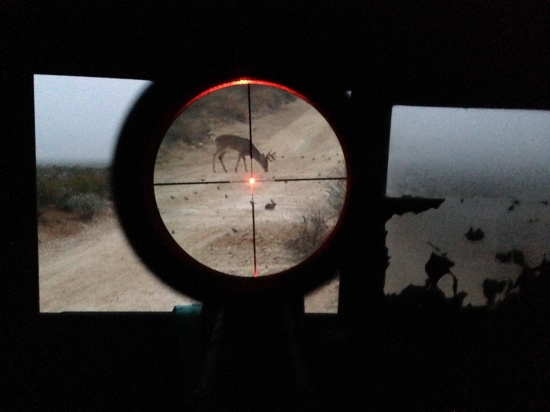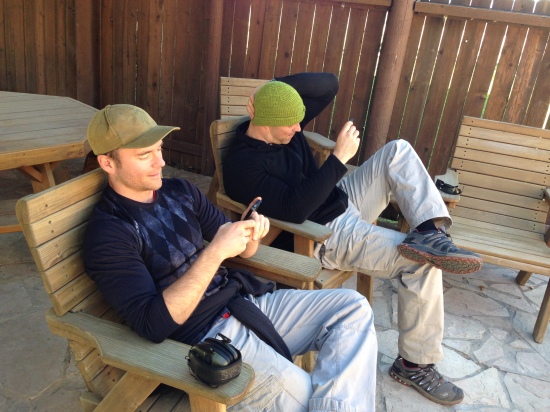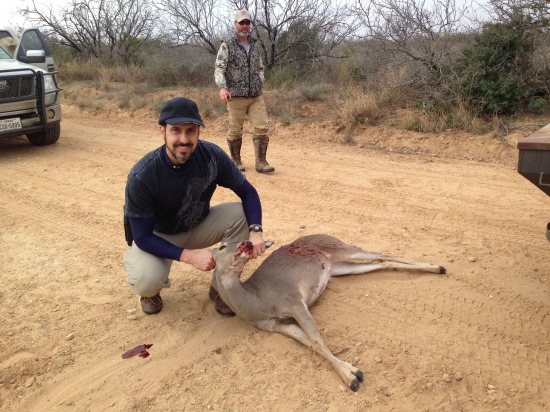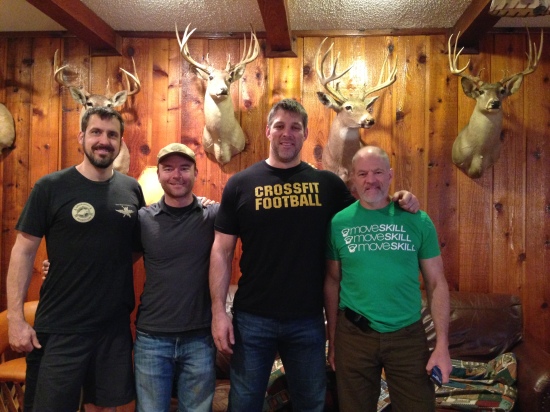
One really important aspect of “being Paleo” is knowing where your food comes from. Understanding the right way to hunt is a critical skill for anyone looking to understand sustainable food systems. The following is an excerpt from my book, The Homegrown Paleo Cookbook, which is not only a cookbook, but a full guide to homesteading and other lifestyle-based tips to help you better understand how to truly live in a more sustainable way. Hunting can be intimidating, especially if you were never taught as a child. Here are some tips to help you get started.
“One does not hunt in order to kill; on the contrary, one kills in order to have hunted.” —Jose Ortegay Gasset
For some, hunting is a deeply spiritual activity; for others, it’s about getting out with friends; and for still others, it’s a way to practice and hone the skills of tracking and shooting. But no matter the motivation, hunting, like farming, helps you connect with nature and your food.
One reason for hunting that I find particularly compelling is that, in many parts of the country, it’s an important part of conservation efforts. As habitat loss causes a decrease in the number of predators, the population of prey species can reach unnaturally high levels. For example, in much of the Northeast there are way too many deer. That has led to a sharp decrease in certain plant species, which in turn has led to a shift in the forest ecology. For one, the disappearance of low-growing shrubs harms the native songbirds that nest in them.
Also, eating wild game, especially herbivores and fish, has many health benefits. Because they are moving freely and aren’t eating factory-farmed grains, wild game is leaner and has more anti-inflammatory omega-3s.
And let’s not forget that it’s free! Well, after you pay for your gear, license, travel, processing, and so on. But seriously, my buddy Charles Mayfield got four deer this past season. That’s about 350 pounds of meat, and even with all the associated costs, that’s a pretty good deal. (He also furnished me with the images for this post. Here he is below, from one of his trips with Robb.)
I’m fortunate to receive a steady stream of venison and other wild game from hunter friends, most of whom learned to hunt as kids. I polled several of them to find out how I could learn to hunt as an adult. If you’ve never done it before and think hunting is something you’d like to pursue, here are some tips from folks who are regulars:
- Take a gun safety course and a hunting safety course. Gun safety courses are usually offered through local police departments, and your state wildlife agency will have information about hunting courses.
- Try a few different types of hunting. You may like hunting quail much more than hunting elk. Maybe you like being still in a duck blind, or maybe you prefer being more mobile. Or maybe fishing is your thing. Try a bunch of different styles out until you find the one that suits you. If you have a friend who can take you, you can usually tag along and observe without a hunting license, and some states offer apprentice hunting licenses. Testing the waters is also a good way to figure out what type of gear you’ll need before you make the investment.
- Look up the “Unlimiteds.”Conservation organizations such as Ducks Unlimited, White Tail Unlimited, and Trout Unlimited can teach you everything you need to know about the animal you’ll be hunting. Most of them have outings and other opportunities to expose you to hunting, and they’re great ways for those who didn’t grow up hunting to get acquainted with it. Many also have social media outlets where you can post that you’re looking to tag along on a hunting trip. It’s a great way to connect with other hunters.
- Decide how much money you’d like to spend. There are two main approaches to hunting: with little time and a lot of money, with a lot of time and little money. For a hefty price tag, a big game ranch will take you out to shoot at anything from elk and buffalo to gazelles and wildebeests. They’ll teach you everything, including how to load a gun and where to point it. The more economical option is to borrow some guns to figure out which you really like before you buy, to test out some local hunting options with friends or a local unlimited chapter, and to accumulate your gear slowly.
- Learn how to process. When we were in our early twenties, Andrew once brought me a whole trout, assuming I knew how to clean it. I had no idea what I was doing and made a huge mess in the sink, and we ended up with no meat. Knowing what to do with your game is critical. Plus, if you can field dress a deer, you’ll spend a lot less energy hauling it back to your vehicle, and examining the liver and other organs can also give you a clue about the health of the animal. It’s ideal to learn field dressing from a fellow hunter. It’s also a good idea to take a basic butchering class. While in some areas there are places that will butcher your animal for you, it’s a great skill to have yourself.
- Own your bullet. At the end of the day, great hunters understand that once the bullet leaves their gun, they’re responsible for it. You own your shot. Before you pull the trigger, be sure you have properly identified your target so that you don’t shoot something you don’t intend to eat. You are holding the life of another being in your hands, and that’s no small thing. Taking another life should be done with respect, humility, and a mindful understanding that the animal is giving its life so that you can eat. It’s also critical to leave the environment better than you found it. Pack up your trash and respect the land you are using.
Again, if you are interested in connecting more with your food, please pick up a copy of The Homegrown Paleo Cookbook. You’ll find this hunting chapter, plus information on how to have backyard chickens, raise bees, plus over 100 recipes, DIY crafts and much more. Check out my blog, Modern Farm Girls Podcast, and Instagram account where I post images from the farm daily.
Cheers! – Diana




I hunt deer in Kansas and Minnesota.
I target hunting areas where there exist higher deer densities, and find that Those areas are usually adjacent to standing or harvested corn fields.
I don’t think I’ve ever field dressed a deer that didn’t have corn in its stomach.
To what extent does the term “factory-farmed grains” discourage consuming venison that thrives from corn in farm country?
Or is the primary benefit the avoidance of meat produced from meal in factory feedlots?
More so the latter. At least the deer are still outside roaming around like they should and eating other things than just purely corn. I would still eat the deer.
Thanks for this post. I’ve been a hunter most of my life, and I’ve got to say that access to high-quality, organic protein is my number one motivation. And like you said, depending on how much gear you buy (and how lucky/good you are), it CAN be cost-effective.
I recently wrote a post comparing nutritional data for some common wild game animals vs. domestic equivalents that readers might find interesting. http://www.zerotohunt.com/nutrition-wild-game-food/
How is this a “how to hunt if your dad never taught you” article? The best info is to try different types.
Okay, so here’s the deal. Hunter safety courses gloss over all the details about hunting. There is no way you are going to one of those classes prepared to kill an animal. How about an article on how to local areas to hunt, different animals and requirements around those, where to find info on local laws? This article is a joke.
Thanks for the post. While not diving into the details of learning to hunt, it does give a good overview of some of the key aspects. I have a lofty goal of being able to get all of my protein from wild game, although having never hunted before it might be a few years before I get to that point.
I am disabled with 2 blown shoulders and would like to learn to hunt and clean my kill. 1st thing is, what type of rifle could I use without much of a kick back ? And, 2nd where can I go to learn to hunt and clean the animal ?
They make managed recoil ammo that might be helpful. You can check this out too https://1source.basspro.com/index.php/component/k2/90-shooting/1322-smaller-caliber-rifles-for-aging-deer-hunters. A crossbow might be another option.
As for learning to field dress an animal and such, there are classes in some areas. You might also be able to find a local hunter willing to show you the ropes (ask friends, family, neighbors, colleagues, etc.). If nothing else, there are some good videos on YouTube that show you how.
Pretty good article! Definitely agree with trying out different types of hunting, especially if those are beginner friendly: you shouldn’t do big game right away in my exprience but trying out various types of small game/deer is a must.
Regarding Bob’s question about problems with shoulders – try out less recoil caliber rifles like 6.5 creedmoor, it worked for me(my right shoulder is a mess with rotator cuff problems). Also look into various recoil reduction additions – muzzlebreak, silencer, maybe a custom stock or chassis with reduced recoil.